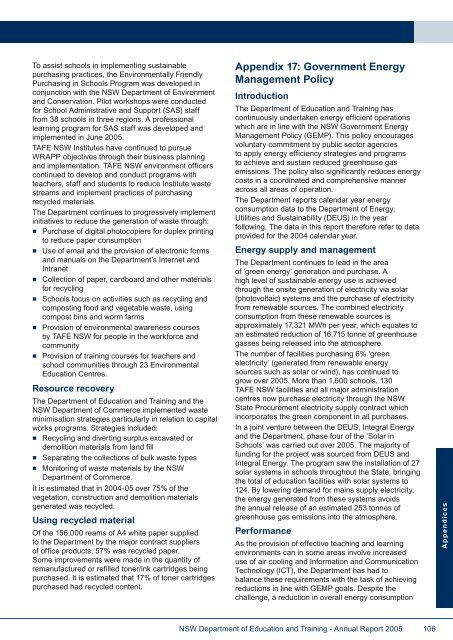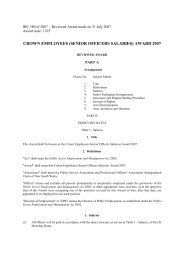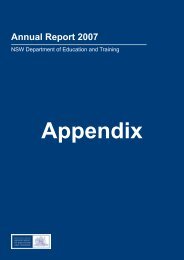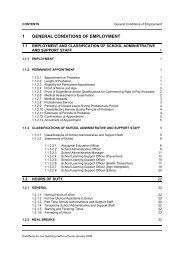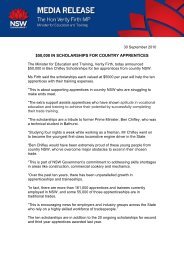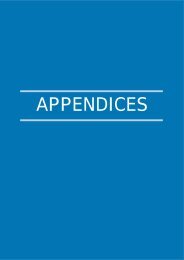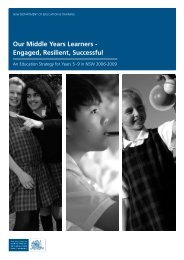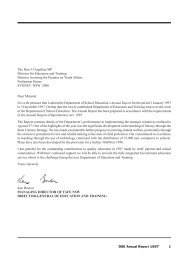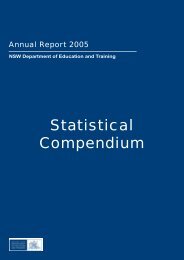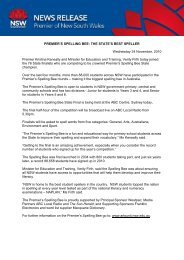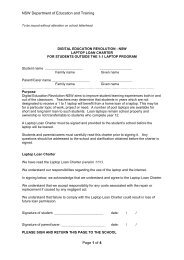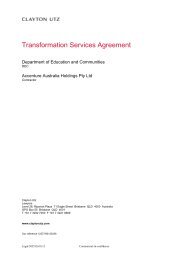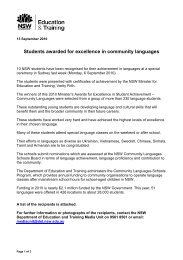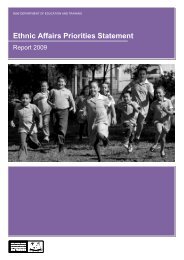Annual Report 2005 NSW Department of Education and Training
Annual Report 2005 NSW Department of Education and Training
Annual Report 2005 NSW Department of Education and Training
You also want an ePaper? Increase the reach of your titles
YUMPU automatically turns print PDFs into web optimized ePapers that Google loves.
To assist schools in implementing sustainable<br />
purchasing practices, the Environmentally Friendly<br />
Purchasing in Schools Program was developed in<br />
conjunction with the <strong>NSW</strong> <strong>Department</strong> <strong>of</strong> Environment<br />
<strong>and</strong> Conservation. Pilot workshops were conducted<br />
for School Administrative <strong>and</strong> Support (SAS) staff<br />
from 38 schools in three regions. A pr<strong>of</strong>essional<br />
learning program for SAS staff was developed <strong>and</strong><br />
implemented in June <strong>2005</strong>.<br />
TAFE <strong>NSW</strong> Institutes have continued to pursue<br />
WRAPP objectives through their business planning<br />
<strong>and</strong> implementation. TAFE <strong>NSW</strong> environment <strong>of</strong>ficers<br />
continued to develop <strong>and</strong> conduct programs with<br />
teachers, staff <strong>and</strong> students to reduce Institute waste<br />
streams <strong>and</strong> implement practices <strong>of</strong> purchasing<br />
recycled materials.<br />
The <strong>Department</strong> continues to progressively implement<br />
initiatives to reduce the generation <strong>of</strong> waste through:<br />
• Purchase <strong>of</strong> digital photocopiers for duplex printing<br />
to reduce paper consumption<br />
• Use <strong>of</strong> email <strong>and</strong> the provision <strong>of</strong> electronic forms<br />
<strong>and</strong> manuals on the <strong>Department</strong>’s Internet <strong>and</strong><br />
Intranet<br />
• Collection <strong>of</strong> paper, cardboard <strong>and</strong> other materials<br />
for recycling<br />
• Schools focus on activities such as recycling <strong>and</strong><br />
composting food <strong>and</strong> vegetable waste, using<br />
compost bins <strong>and</strong> worm farms<br />
• Provision <strong>of</strong> environmental awareness courses<br />
by TAFE <strong>NSW</strong> for people in the workforce <strong>and</strong><br />
community<br />
• Provision <strong>of</strong> training courses for teachers <strong>and</strong><br />
school communities through 23 Environmental<br />
<strong>Education</strong> Centres.<br />
Resource recovery<br />
The <strong>Department</strong> <strong>of</strong> <strong>Education</strong> <strong>and</strong> <strong>Training</strong> <strong>and</strong> the<br />
<strong>NSW</strong> <strong>Department</strong> <strong>of</strong> Commerce implemented waste<br />
minimisation strategies particularly in relation to capital<br />
works programs. Strategies included:<br />
• Recycling <strong>and</strong> diverting surplus excavated or<br />
demolition materials from l<strong>and</strong> fill<br />
• Separating the collections <strong>of</strong> bulk waste types<br />
• Monitoring <strong>of</strong> waste materials by the <strong>NSW</strong><br />
<strong>Department</strong> <strong>of</strong> Commerce.<br />
It is estimated that in 2004-05 over 75% <strong>of</strong> the<br />
vegetation, construction <strong>and</strong> demolition materials<br />
generated was recycled.<br />
Using recycled material<br />
Of the 156,000 reams <strong>of</strong> A4 white paper supplied<br />
to the <strong>Department</strong> by the major contract suppliers<br />
<strong>of</strong> <strong>of</strong>fice products, 57% was recycled paper.<br />
Some improvements were made in the quantity <strong>of</strong><br />
remanufactured or refilled toner/ink cartridges being<br />
purchased. It is estimated that 17% <strong>of</strong> toner cartridges<br />
purchased had recycled content.<br />
Appendix 17: Government Energy<br />
Management Policy<br />
Introduction<br />
The <strong>Department</strong> <strong>of</strong> <strong>Education</strong> <strong>and</strong> <strong>Training</strong> has<br />
continuously undertaken energy efficient operations<br />
which are in line with the <strong>NSW</strong> Government Energy<br />
Management Policy (GEMP). This policy encourages<br />
voluntary commitment by public sector agencies<br />
to apply energy efficiency strategies <strong>and</strong> programs<br />
to achieve <strong>and</strong> sustain reduced greenhouse gas<br />
emissions. The policy also significantly reduces energy<br />
costs in a coordinated <strong>and</strong> comprehensive manner<br />
across all areas <strong>of</strong> operation.<br />
The <strong>Department</strong> reports calendar year energy<br />
consumption data to the <strong>Department</strong> <strong>of</strong> Energy,<br />
Utilities <strong>and</strong> Sustainability (DEUS) in the year<br />
following. The data in this report therefore refer to data<br />
provided for the 2004 calendar year.<br />
Energy supply <strong>and</strong> management<br />
The <strong>Department</strong> continues to lead in the area<br />
<strong>of</strong> ‘green energy’ generation <strong>and</strong> purchase. A<br />
high level <strong>of</strong> sustainable energy use is achieved<br />
through the onsite generation <strong>of</strong> electricity via solar<br />
(photovoltaic) systems <strong>and</strong> the purchase <strong>of</strong> electricity<br />
from renewable sources. The combined electricity<br />
consumption from these renewable sources is<br />
approximately 17,321 MWh per year, which equates to<br />
an estimated reduction <strong>of</strong> 16,715 tonne <strong>of</strong> greenhouse<br />
gasses being released into the atmosphere.<br />
The number <strong>of</strong> facilities purchasing 6% ‘green<br />
electricity’ (generated from renewable energy<br />
sources such as solar or wind), has continued to<br />
grow over <strong>2005</strong>. More than 1,600 schools, 130<br />
TAFE <strong>NSW</strong> facilities <strong>and</strong> all major administration<br />
centres now purchase electricity through the <strong>NSW</strong><br />
State Procurement electricity supply contract which<br />
incorporates the green component in all purchases.<br />
In a joint venture between the DEUS, Integral Energy<br />
<strong>and</strong> the <strong>Department</strong>, phase four <strong>of</strong> the ‘Solar in<br />
Schools’ was carried out over <strong>2005</strong>. The majority <strong>of</strong><br />
funding for the project was sourced from DEUS <strong>and</strong><br />
Integral Energy. The program saw the installation <strong>of</strong> 27<br />
solar systems in schools throughout the State, bringing<br />
the total <strong>of</strong> education facilities with solar systems to<br />
124. By lowering dem<strong>and</strong> for mains supply electricity,<br />
the energy generated from these systems avoids<br />
the annual release <strong>of</strong> an estimated 253 tonnes <strong>of</strong><br />
greenhouse gas emissions into the atmosphere.<br />
Performance<br />
As the provision <strong>of</strong> effective teaching <strong>and</strong> learning<br />
environments can in some areas involve increased<br />
use <strong>of</strong> air cooling <strong>and</strong> Information <strong>and</strong> Communication<br />
Technology (ICT), the <strong>Department</strong> has had to<br />
balance these requirements with the task <strong>of</strong> achieving<br />
reductions in line with GEMP goals. Despite the<br />
challenge, a reduction in overall energy consumption<br />
Appendices<br />
<strong>NSW</strong> <strong>Department</strong> <strong>of</strong> <strong>Education</strong> <strong>and</strong> <strong>Training</strong> - <strong>Annual</strong> <strong>Report</strong> <strong>2005</strong> 106


